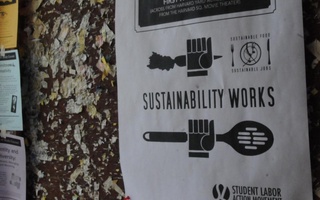Sustainable agriculture advocate Fred Kirschenmann said that society needs to rethink agriculture in a talk in Sever Hall yesterday, arguing that the depletion of mineral and fossil fuel resources, the effects of climate change, and loss of biodiversity indicate that the current agricultural system cannot continue to provide for the Earth’s population indefinitely.
While acknowledging that he had presented “a grim picture,” Kirschenmann insisted that “I think we can beat these challenges that we’re going to be facing.”
The Centre for Health and the Global Environment at Harvard Medical School, Harvard University Hospitality and Dining Services, and the Food Literacy Project co-organized the event so that Kirschenmann, a Distinguished Fellow for the Leopold Center for Sustainable Agriculture at Iowa State University, could present his thoughts on sustainable agriculture to the Harvard community.
Kirschenmann said that, while using up limited fossil fuel resources was a significant problem, it was naïve to think that simply transitioning to green fuel sources will resolve it.
“We have to redesign the food system in this new era that we’re moving into in order to be sustainable,” Kirschenmann said.
“We need to be rethinking the paradigm,” he added. “Part of the solution is to really rethink how we do agriculture.”
Kirschenmann particularly emphasized the importance of educating and engaging urban populations in conversations about agriculture and food production.
“These changes are not going to come from Washington, at least not in the initial stages,” he said, advocating for changes at the level of the local community.
“The [Harvard Community] Garden is probably the result of conversations I once had with him,” Kathleen Frith, Managing Director of the Center for Health and the Global Environment, told the audience as she introduced Kirschenmann.
“We got a lot more people than I expected [to attend],” said Dara B. Olmsted ’00, co-ordinator of the Food Literacy Project at HUHDS. “There were college students, graduate students, staff, alumni, and people from the community.”
Attendee Louisa C. Denison ’11, who has been involved in the Harvard Community Garden project, said she thought Kirschenmann’s talk would stimulate further discussion about sustainability among those involved with Community Garden.
“As gardeners and kids interested in agriculture, we enjoyed the focus on the implementation rather than academics,” said Denison.
Read more in News
Mahindra Humanities Center OpensRecommended Articles
-
 Smithsonian Curator Analyzes Origins Of Food
Smithsonian Curator Analyzes Origins Of Food -
School Committee Pushes Locally Grown FoodThe Cambridge Public School Committee pushed through a joint motion yesterday calling for the use of locally grown food and encouraging progress reports that assess the environmental impact of the policy goal.
-
From Your Garden to Your PlateMost urban residents don’t think of Boston, with its high rise buildings, multi-tiered parking garages, manicured campuses, and concrete condos ...
-
 SLAM Rallies in Support of Workers
SLAM Rallies in Support of Workers -
Harvard Celebrates Food DaySpecial offerings such as Maine Lobster Bisque, five-cheese tortellini with spinach and mushrooms, and New England apple crisp had students going back for seconds and thirds during Wednesday night’s Food Day dinner.
-
Panel Discusses Sustainable FoodThe shrinking source of elements used in fertilizers and the practices of corporate farming pose significant problems for the agriculture ...













